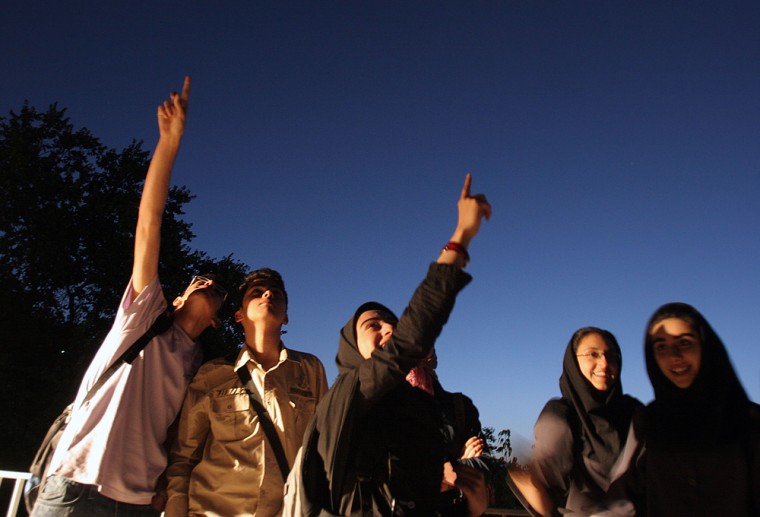Dozens of space travel enthusiasts, most of them women, burst into applause over the weekend at an observatory near the capital as the spacecraft carrying the first Iranian woman to travel into space appeared in the morning sky.
Space passenger Anousheh Ansari, who began her journey into space a week ago aboard a Soyuz TMA-9 capsule from the Baikonur Cosmodrome in Kazakhstan, has become an inspiration to women in male-dominated Iran.
Space enthusiasts who gathered Saturday at the Zaferanieh Observatory in Tehran were rapt as they followed the progress of the craft, visible to the naked eye for about two minutes as it streaked across the sky.
"Anousheh is my hope," said teenager Delagah Dadbeh, watching the spacecraft as tears of joy rolled down her cheek. "She will shine in Iranian history as a woman who broke barriers and succeeded in conquering space with her endeavor.
"Ansari has shown Iranian women the road to progress. We only need to believe in ourselves," Dadbeh said, as another woman, Homa Parvaei, nodded in agreement.
Ansari, the world's first paying female space passenger, left Iran with her family a few years after the 1979 Islamic revolution that toppled the pro-U.S. Shah Mohammad Reza Pahlavi and brought hardline clerics to power. One of the reasons the family left Iran was that the opportunities for a young girl to study science were becoming limited.
Ansari has said she hopes to inspire girls in her homeland to study science.
Iran's state-run media have briefly mentioned Ansari's voyage. But some hardline media criticized state television for even this, dismissing Ansari as a "wealthy woman."
The Iranian Space Agency was the only government-run body to congratulate Ansari on her achievement.
Ansari, 40, is a telecommunications entrepreneur. She is the fourth private passenger to pay a reported $20 million for a space station visit. She joined a Russian cosmonaut and a U.S. astronaut for the trip to orbit, and is due to return to Earth on Friday with crew members who are heading home after a six-month tour of duty.
Hardline clerics in Iran have banned women from running in presidential elections and believe that a woman's sole role is in the home. "The best identity for women is shaped within the family," said Zohreh Tabibzadeh, who heads a state-run women's center. President Mahmoud Ahmadinejad appointed her to the post.
Under the strict interpretation of Islamic law applied in Iran, men may marry up to four wives at the same time, a right not granted to women. To work or travel abroad, a woman needs the permission of her husband or father. But Iranian women enjoy more political rights than women in some neighboring countries.
Under reformist former President Mohammad Khatami there was a loosening of restrictions on social freedoms that benefited women. Ahmadinejad has tried to reimpose those restrictions, but without much success. Many women appear heavily made up in public wearing colorful loose headscarves, a dramatic shift from the 1980s when women were required to appear with black head-to-toe chador.
Meanwhile, aboard the international space station:
- Ansari said in her Weblog on Monday that she was "absolutely amazed at how wonderful the astronauts and cosmonauts are. ... I honestly think we should get astronauts to run for presidency." She also described hygiene in space and the station's water recycling system, quoting a Russian cosmonaut as saying, "We are like brothers and sisters, it is very unique because we drink each other's sweat."
- NASA astronaut Michael Lopez-Alegria, who rode up to the space station with Ansari and is due to take command of the outpost, acknowledged that he has done "a little bit of an about-face on the space tourism thing." He said he initially wasn't sold on the idea, but changed his mind "in large part because of the good that I see being done by people like Anousheh and her predecessors."
- Astronaut Jeff Williams, who is due to return to Earth with Ansari after his six-month stint on the station, said he was most looking forward to peace and quiet as well as the "smells of nature outside, the smells of trees and grass."
